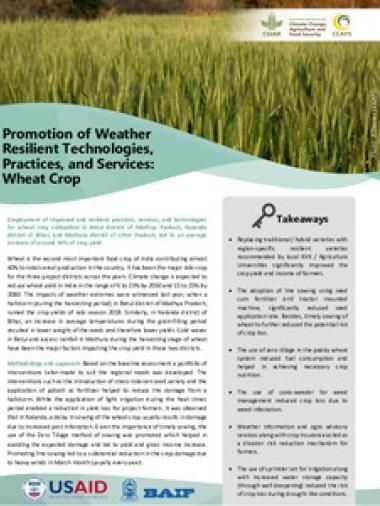Promotion of Weather Resilient Technologies, Practices, and Services: Wheat Crop

Wheat is the second most important food crop of India contributing almost 40% to total cereal production in the country. It has been the major rabi crop for the three project districts across the years. Climate change is expected to reduce wheat yield in India in the range of 6 to 23% by 2050 and 15 to 25% by 2080. The impacts of weather extremes were witnessed last year, when a hailstorm (during the harvesting period) in Betul district of Madhya Pradesh, ruined the crop yields of rabi season 2018. Similarly, in Nalanda district of Bihar, an increase in average temperatures during the grain-filling period resulted in lower weight of the seeds and therefore lower yields. Cold waves in Betul and excess rainfall in Mathura during the harvesting stage of wheat have been the major factors impacting the crop yield in these two districts. Employment of improved and resilient practices, services, and technologies for wheat crop cultivation in Betul district of Madhya Pradesh, Nalanda district of Bihar, and Mathura district of Uttar Pradesh, led to an average increase of around 50% of crop yield.
Citación
CCAFS, BAIF. 2020. Promotion of Weather Resilient Technologies, Practices, and Services: Wheat Crop. The CGIAR Research Program on Climate Change, Agriculture and Food Security (CCAFS).